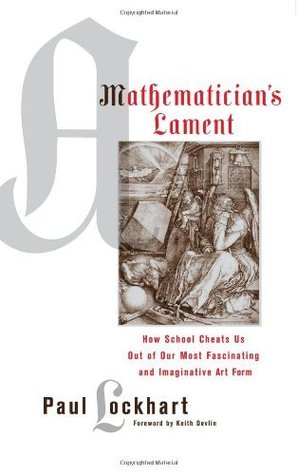More on this book
Community
Kindle Notes & Highlights
Read between
September 28 - October 2, 2019
If you want to build a ship, don’t drum up people to collect wood and don’t assign them tasks and work, but rather teach them to long for the endless immensity of the sea. —ANTOINE DE SAINT EXUPÉRY
In fact, if I had to design a mechanism for the express purpose of destroying a child’s natural curiosity and love of pattern-making, I couldn’t possibly do as good a job as is currently being done—I simply wouldn’t have the imagination to come up with the kind of senseless, soul-crushing ideas that constitute contemporary mathematics education.
The only people who understand what is going on are the ones most often blamed and least often heard: the students. They say, “Math class is stupid and boring,” and they are right.
That’s what math is—wondering, playing, amusing yourself with your imagination.
I’m complaining about the lack of mathematics in our mathematics classes.
At no time are students let in on the secret that mathematics, like any literature, is created by human beings for their own amusement;
Music can lead armies into battle, but that’s not why people write symphonies.
I don’t see how it’s doing society any good to have its members walking around with vague memories of algebraic formulas and geometric diagrams, and clear memories of hating them.
Mathematics should be taught as art for art’s sake. These mundane “useful” aspects would follow naturally as a trivial by-product. Beethoven could easily write an advertising jingle, but his motivation for learning music was to create something beautiful.
And the glory of it is its complete irrelevance to our lives. That’s why it’s so fun!
What other subject is routinely taught without any mention of its history, philosophy, thematic development, aesthetic criteria, and current status? What other subject shuns its primary sources—beautiful works of art by some of the most creative minds in history—in favor of third-rate textbook bastardizations?
In particular, contradiction is usually regarded as rather boring. So at the very least we want our mathematical creations to be logically consistent.
Now hold on a minute, Paul. Are you telling me that mathematics is nothing more than an exercise in mental masturbation? Making up imaginary patterns and structures for the hell of it and then investigating them and trying to devise pretty explanations for their behavior , all for the sake of some sort of rarified intellectual aesthetic? Yep.
The historical development of mathematics (especially in the past couple of centuries) exhibits a consistent, undeniable pattern: first come the problems, whose sources are many and varied, often inspired by the real world. Eventually, connections are made between diverse problems, usually due to common elements that appear in various proofs. Abstract structures are then devised that can “carry” the kind of information that forms the connection (the classic example being the “group” concept, which captures abstractly the idea of a closed system of activities, e.g., algebraic operations like
...more
So let me leave you with the only practical advice I have to offer: just play! You don’t need a license to do math. You don’t need to take a class or read a book. Mathematical Reality is yours to enjoy for the rest of your life. It exists in your imagination and you can do whatever you want with it. Including nothing, of course.


